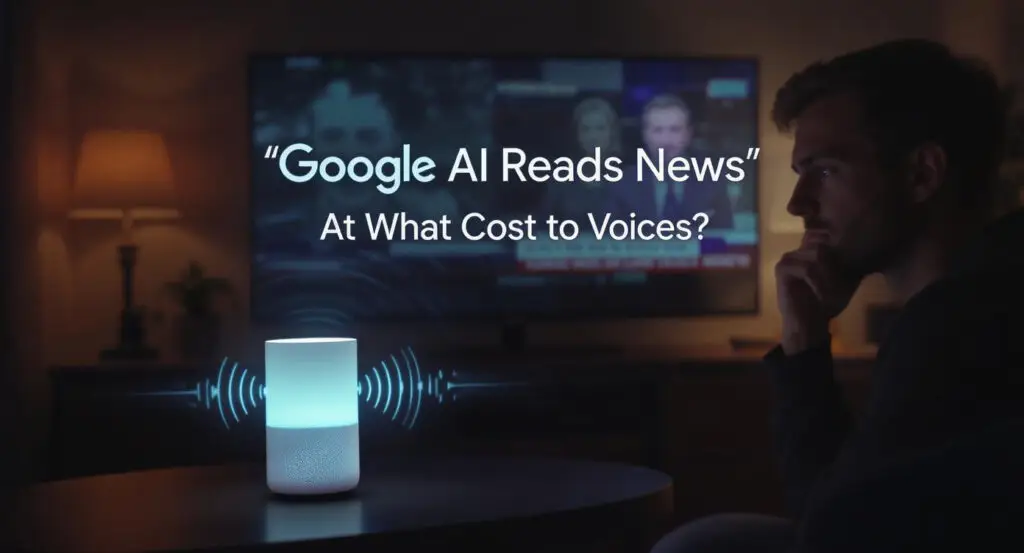Google is no longer just helping you find answers. It’s now reading them to you. In its latest technological shift, the tech giant has begun testing AI-generated voice summaries within its experimental Search Generative Experience. The move transforms search from a reading activity into a listening one, removing human voices in favour of a neutral, machine-composed narrator.
This new voice feature is currently being tested in the U.S., exclusively on mobile and in English. But even in its limited scope, the implications are wide-ranging. Rather than scanning headlines or clicking links, users will hear AI-generated answers summarised by Google’s Gemini model, voiced by synthetic narration, and shaped entirely by algorithms. The goal, according to Google, is to make information more accessible. But critics are asking, at what cost?
A Smooth Voice, But No Human Behind It
Unlike podcasts, newsreaders, or audiobooks, Google’s voice summaries aren’t quoting anyone directly. They are not pulling soundbites or even directly reading articles. Instead, the AI generates a polished, spoken synopsis, stitched together from content scraped across the web. The result is a generic, neutral-sounding voice delivering information without attribution no journalist named, no publication linked, no original insight preserved.
This subtle shift marks a profound change. As the AI speaks, it performs the role of both narrator and editor. “Google isn’t just indexing that information; it’s rewriting it and giving it its own voice,” the article notes. What disappears in the process is the original human perspective. The voice may sound helpful, but it speaks from nowhere and for everyone.
Accessibility or Authority?
Google frames the feature as an accessibility improvement. And indeed, it could be. The spoken summaries might benefit users who are visually impaired, commuting, multitasking, or otherwise unable to read a screen. It’s a pitch for convenience an internet you can listen to on the go.
But with convenience comes curation. Once AI decides what’s worth saying and how to say it, the power shifts dramatically. Details are trimmed for clarity. Stories are compressed into digestible blurbs. And most crucially, the origin of the information is erased. “Whose version didn’t make the cut?” the article asks. It’s a question with increasingly fewer answers as Google’s summaries replace the need to click through to original sources.
The Squeeze on Publishers
For news publishers and independent creators, the feature is another blow. Google’s AI doesn’t send traffic back to websites. It doesn’t quote directly. It doesn’t even give credit where credit is due. As users become content consumers through AI narration, the underlying creators see fewer clicks, lower impressions, and declining visibility.
This isn’t new behaviour from Google. Featured snippets, answer boxes, and instant results have long syphoned attention away from actual webpages. But voice-powered summaries escalate the issue. Now, instead of reading a brief and choosing where to go next, users get a complete, polished answer without ever seeing a headline.
“It’s not just taking the content; it’s changing the equation,” the article observes. Google becomes both the gatekeeper and the storyteller, while media outlets and journalists are reduced to background sources, part of the AI’s invisible training data.
Search is Changing But Are We Ready?
Google calls this an “experiment.” But the direction is clear. Search is evolving from a tool for finding to a platform for hearing. The screen becomes optional. The voice becomes central. And the source? It fades into the background.
This raises deeper questions about the nature of information in the AI age. Whose stories are heard? Who gets credit? What gets left out in the name of clarity or neutrality? And perhaps most importantly, who benefits when a tech giant becomes the voice of the internet?
“Maybe it’s convenient. Maybe it’s evolution,” the article suggests. “Or maybe it’s the slow fading of human voices behind a layer of AI that sounds helpful, sounds neutral, sounds like no one in particular and everyone at once.”
As AI-powered narration becomes more common, the line between helpful innovation and editorial dominance grows thinner. The question isn’t whether Google will speak; it’s who will be left listening and whose voice will be lost in the silence.























